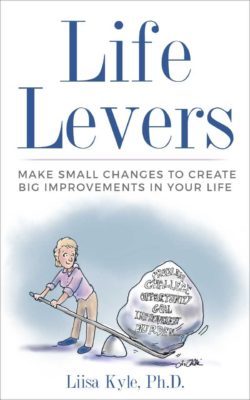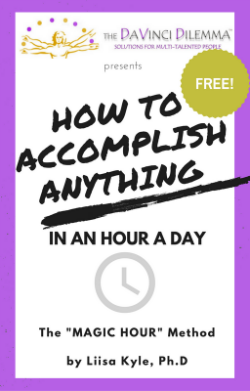 If you’re like me, even if you were independently wealthy (which is definitely not like me!) you wouldn’t want your talents to just be hobbies. You’d like to ideally create value for others and get paid for what you love. There’s just one problem. You just can’t see why anyone would pay you for being passionate about scrapbooking, or drumming, or jewelry-making. As soon as you think of what you’d like to do, ideas like, “There’s too much competition,” “People won’t pay for that,” It’s not practical,” and of course, the ever-popular “I’m not good enough” crop up to create an insurmountable roadblock on the path to the money.
If you’re like me, even if you were independently wealthy (which is definitely not like me!) you wouldn’t want your talents to just be hobbies. You’d like to ideally create value for others and get paid for what you love. There’s just one problem. You just can’t see why anyone would pay you for being passionate about scrapbooking, or drumming, or jewelry-making. As soon as you think of what you’d like to do, ideas like, “There’s too much competition,” “People won’t pay for that,” It’s not practical,” and of course, the ever-popular “I’m not good enough” crop up to create an insurmountable roadblock on the path to the money.
When you only see one road, it’s easy to be blocked. What you need is a helpful detour. Best of all, it’s actually fun.
I call this the Chinese Menu approach to career exploration. Back when I was a kid in New York, and Chinese food still seemed exotic and cryptic, Chinese menus were long, long red and white paper or plastic sheets with hundreds of items on them. To order, you were supposed to choose “One from Column A and Two From Column B.” With this method, you might end up with chicken chow mein, an egg roll and fried rice, or spare ribs, lo mein noodles and won ton soup, or any of a number of permutations. You could conceivably have a different meal every time.
What I propose you do is to create your own menu of items, but these are simply things you love to do and areas of interest. Then, combine them in obvious, or interesting, or unexpected or even downright kooky ways.
Taking the example of jewelry-making. At first blush, you might think that really the only way to make money from this would be to have random people buy your creations, at a crafts fair, or if you’re internet-savvy, on a site like etsy.com. This is fine, and many people have success selling their products this way. But there could be many other ways of profiting from your talent that you’d find equally or even more satisfying.
For example, if on your long chinese menu of things you love, you also had teaching and working with children, you could get the idea of starting an after-school jewelry shop program or a crafts school. If speaking and travel were on your list, you might give lectures on jewelry design at associations or clubs around the country, or become a buyer for a jewelry firm, seeking out rare beads or ethnic trends from around the world and presenting your finds to your colleagues.
You can see how this applies to you. Here are a few other examples:
Writing + singing + health = presenting musical productions in hospitals or nursing homes, or creating a workout DVD featuring your own songs, or performing in schools about nutrition and health, or creating a kid’s TV show on the subject
Drawing + Travel = creating a travel guides, illustrating a coffee table book, designing a line of souvenirs or travel-related fashions
If you are at a loss to think of any way that you could use your talents in a career that someone should actually pay you to do, this exercise may surprise you with how many possibilities may be out there, either already in existence or waiting to be created.
Activity: Here’s how to generate the richest possible list for your Chinese menu:
- Get a big sheet of paper (or several)
- Now it’s blue-sky time. Think of everything you love and are good at. Write until your can’t think of anything else in the category. Think in terms of:
– Your talents (of course) and every iteration of them (writing could throw off both journalism and poetry for example)
– People you like to work with (kids? Old folks? Artists? Business types? Spiritual seekers?)
– Places you love to be (the beach? The mountains? Big cities? In school? In the gym?)
– Activities you love, not necessarily related to your talents ( travel, rock-climbing, Scrabble and other games, movies, comedy, theater)
– General stuff you’re interested in. Think back also to what you liked as a kid. (historical periods, sports, animals, art, types of music, places, languages)
– Skills you are good at, and like doing, that could be business-related (problem-solving, mediation, speaking, training, organization and planning, computer stuff, social media, bookkeeping, etc.)
– Absolutely anything else - You should have a huge list! Now here is the game part. Pick any two or three and see what that combo does for you. The choices can come from different columns, or the same one. Force yourself to come up with job titles or business ideas that would involve those two or three elements, even if they seem improbable or the job title does not already exist. Circle the possibilities that inspire you. What would it take to start to make any of these a reality?
- (NOTE: Another fun way of playing this game is to print out all the ideas, cut them up with scissors and create “decks” of your talents, interests and skills. Put the decks face down, draw three cards and see what you create!)
Can you now see that there might more ways than you thought to make money with your talents and interests? What are some fun career or business ideas combining two or more of yours?
*****
If you’d like to share or publish this article, you may, if you include the author’s name, a link to this original post and the following text blurb:
Are you struggling with too many talents, skills, ideas? You may have The Da Vinci Dilemma™! Find tools, fun quizzes, coaching, inspiration and solutions for multi-talented people at http://www.davincidilemma.com/.



